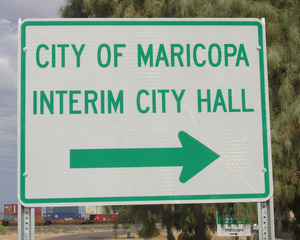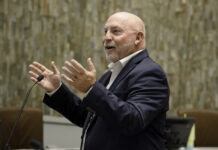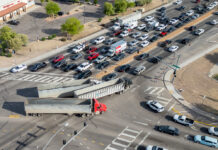
After fits and starts over several years, north of $100,000 spent on land options and consultants, and multiple conflicts of interests among City Council members, Maricopa is back to square one in trying to get a city hall.
The city has formed an as-yet unnamed group of residents who will be working to figure out what should go in the city’s core. They are not specifically charged with determining and siting a city hall, but they will be working on what Maricopa’s future downtown will look like and feature, which could include city facilities.
It has been a long and unfruitful road back to the beginning.
It was 2003 and Maricopa had just become Arizona’s newest municipality when the subject of a city hall first surfaced when the developer of Rancho El Dorado offered to donate 20 acres for a municipal complex.
Since then, all the time, money and labor has netted no land, unfulfilled studies and no city hall complex (click here for timeline). Meanwhile, city government operates out of used manufactured offices on land owned by Mayor Kelly Anderson’s family, with rental cost automatically escalating 10 percent a year.
After all those years, money and effort, the city of Maricopa is no closer now to having a city hall than it was when it was incorporated. When pressed on what specific marching orders the Council has given staff regarding acquiring a city hall, Management Assistant Danielle Casey said, “I think the city has been so busy getting a police department and fire department. That’s what we’ve been told to focus on.”
Vice Mayor Brent Murphree agrees: “I don’t know that there has been definitive marching orders from the Council because there are so many people who have ties to this process.”
He was referring to the fact that a majority of the City Council has had some significant conflicts of interest involving Maricopa, its city hall and/or its quest to get one, such as:
• Councilman Stephen Baker was the real estate agent for Dennis Peed, whose 150-acre property the city offered to buy for $14.6 million or $97,000 per acre. Baker recused himself from voting on the purchase, although he didn’t explain publicly in advance why. Under a traditional commission structure, he stood to gain more than $400,000 if the deal had gone through.
• Councilman Edward Farrell is in business outside of Maricopa with Mike Ingram, a principal of El Dorado Holdings, which donated 20 acres to the city for a city hall and later sought to sell 100 acres for $6.5 million or $65,000 per acre for a city hall.
• Mayor Kelly Anderson family owns the land on which the interim city hall rests. The lease calls for a 10% annual rent increase. Anderson has recused himself from voting on that lease and on another property with a family interest.
• Councilman Joe Estes, an attorney, has cited a possible conflict because a client he represented may have an interest in the issue, and he now is in-house attorney for a land company.
• Councilman Will Dunn had a conflict because his grandfather owned part of a parcel being considered for a city hall site.
“I think that’s been the biggest impediment,” Murphree said. “I think it’s been huge.
That’s one of the reasons why we’re pulling this commmitte together with a group of people who don’t have that special interests.”
Councilman Joe Estes doesn’t think it has been the conflicts holding up the show.
“I don’t think that’s been an impediment,” Estes said. “The impediment has been there has been so much second guessing as to choosing a final site because it’s going to have a lasting impact on the city.”
Maricopa, Estes said, is a small town, and all the councilmembers work and have businesses in Maricopa, so conflicts of interest naturally will happen.
“There’s no problem with having a conflict,” he said. “There’s a problem with not disclosing a conflict.”
Last week, without fanfare or public announcement, the city gathered a task force of citizens from diverse backgrounds and developments to gauge the public’s sentiment on what is wanted in the city’s commercial core along John Wayne Parkway, Casey said. That is needed before the city hall question is answered, she said, so the city can locate services there if that’s what the citizenry wants. If it builds a city hall complex away from the downtown area or the commercial core fills up with stores, there might not be an opportunity to site services where residents say they want them.
It should take a few months “to get good answers and ideas, but the process is important. We’re not looking at two years or anything,” Casey said, adding, “We’re not going to rush the process. We want to make sure it’s done right.”
She did note that the task force has not been asked to do anything regarding a city hall for Maricopa.
“What we hear from this task force will guide what needs to go downtown,” Casey said. “Before we were putting the chicken before the egg.”
“Honestly, they just never got to a point where any of the sites were what the City Council wanted, so nothing happened,” she said.
If Maricopa had it to do over, Murphree said, he would “make sure we looked at all the special interest ties we had on the Council to this selection process. We made a mistake assuming that people would declare their interests and their conflicts and step down, but that hasn’t happened.”
What Maricopa needs to do now, Murphree said, is tighten up the process, let the citizens committee work and have the Council do its job.
“People know that we need a new library, recreation facility,” Murphree said, “and we need the Council to buy into their community, establish a place we can go that isn’t a trailer on a vacant lot, a place the community understands that this is their home, a tangible asset in their community that says we’ll be here for another 50 or 100 years.”
What Estes would have done differently is have the Council do more deciding and less second-guessing.
“I would have taken a stand and said we need to make a decision, do it, move forward with it and get it done,” Estes said. “That’s what we were elected to do, make decisions.”
While Estes noted that he thinks most of the Council prefers a downtown location, he thinks that area will be much better used for commercial and cultural uses, and too much space taken for city services reduces that.
“City hall doesn’t have to be in a prime location, and I see downtown as a prime location,” he said. That said, he added, it also doesn’t need to be a huge, single complex. Some services need to be at the same place, such as having one stop for permit approval, he said, but others are better off dispersed, such as police, fire, parks and libraries.
“Originally the discussion was having a minimum of 60 acres so we could consolidate services,” Estes said. “But I think after having looked at (consultants’) reports, there are things we can decentralize and go with a smaller footprint for a city hall site and still have all these needs served.”
Estes said he expects that the Council will appoint a citizens task force – each council member appointing one person – that will review the information and make a recommendation. He doesn’t see that as being the same group as the downtown task force that just got together.
He also believes that it is the Council that needs to spearhead the drive. The Council, he said, is looking at once again scheduling retreats starting next month and including what to do about city hall within them.
“It’s going to take us as a Council sitting down discussing what as a Council we want and moving forward with it,” Estes said.
Murphree and Estes have high goals for Maricopa’s eventual site.
“One of the big goals it to make it an area where people will want to come to for work, for dinner, for entertainment,” Murphree said of a city hall in or near the commercial district. “We want it to be fully used, to benefit the community in a real way.”
Said Estes: “We need a city hall site. We need to show everyone else that the city’s invested in itself and we have an identity. We don’t have an identity without a city hall.”
Mayor Kelly Anderson and Assistant City Manager Rick Buss did not return calls seeking comment on this issue.






![MHS G.O.A.T. a ‘rookie sleeper’ in NFL draft Arizona Wildcats wide receiver Jacob Cowing speaks to the press after a practice Aug. 11, 2023. [Bryan Mordt]](https://www.inmaricopa.com/wp-content/uploads/2024/04/cowing-overlay-3-218x150.png)





![Alleged car thief released without charges Phoenix police stop a stolen vehicle on April 20, 2024. [Facebook]](https://www.inmaricopa.com/wp-content/uploads/2024/04/IMG_5040-218x150.jpg)




